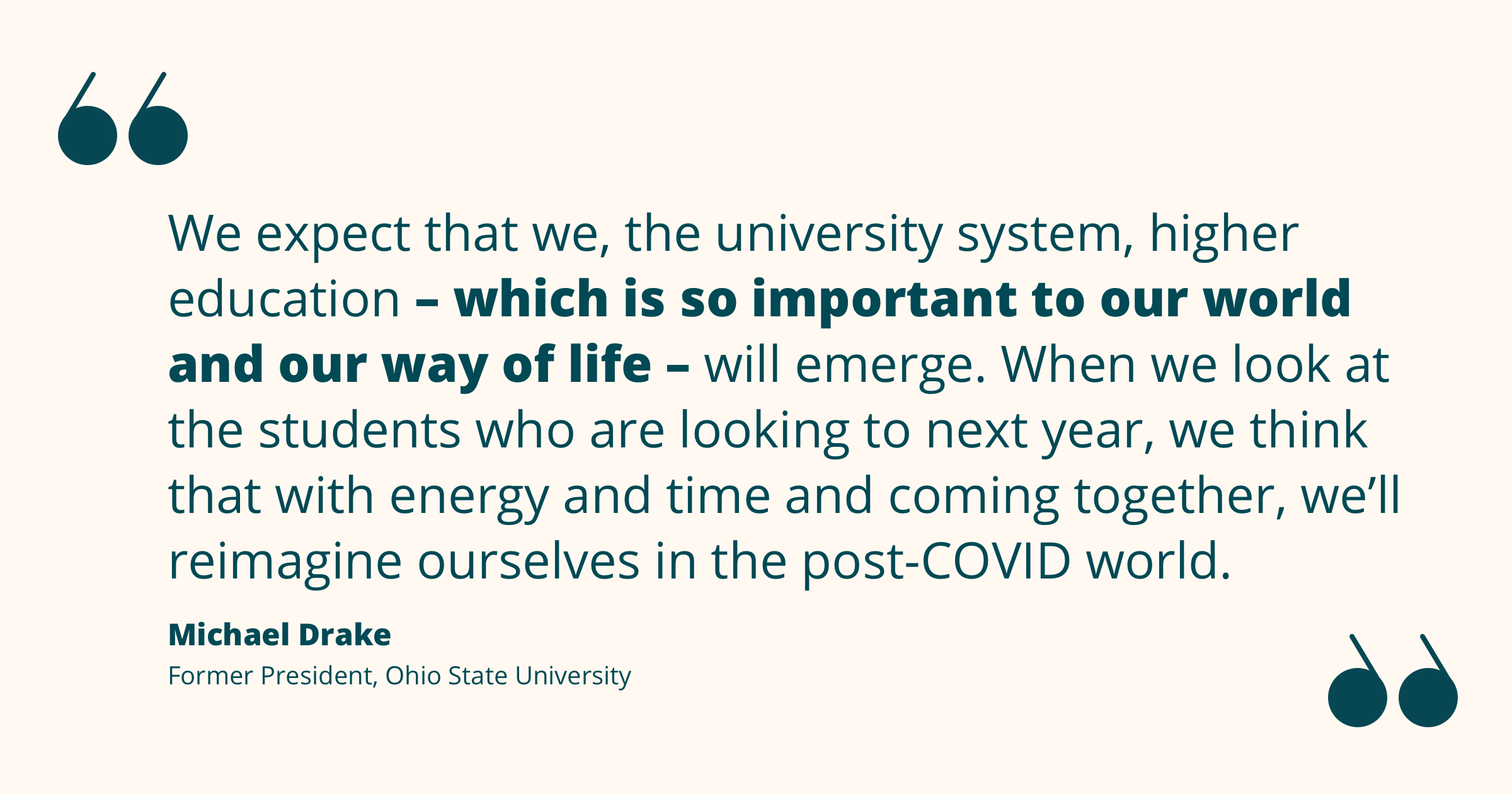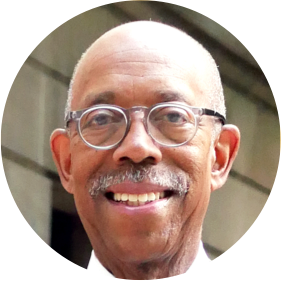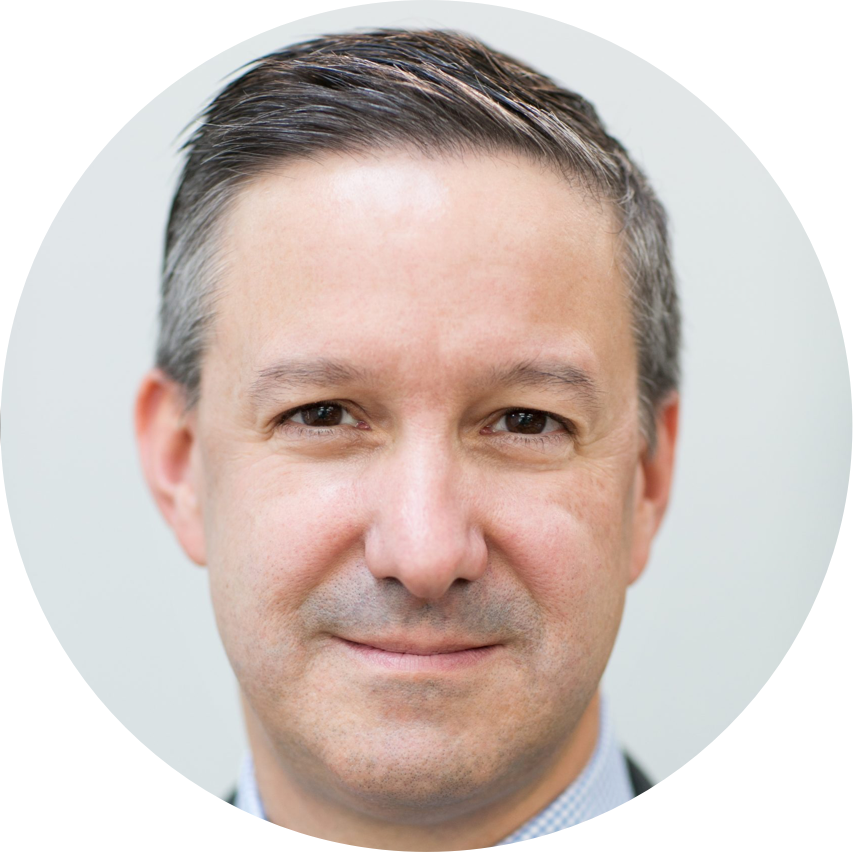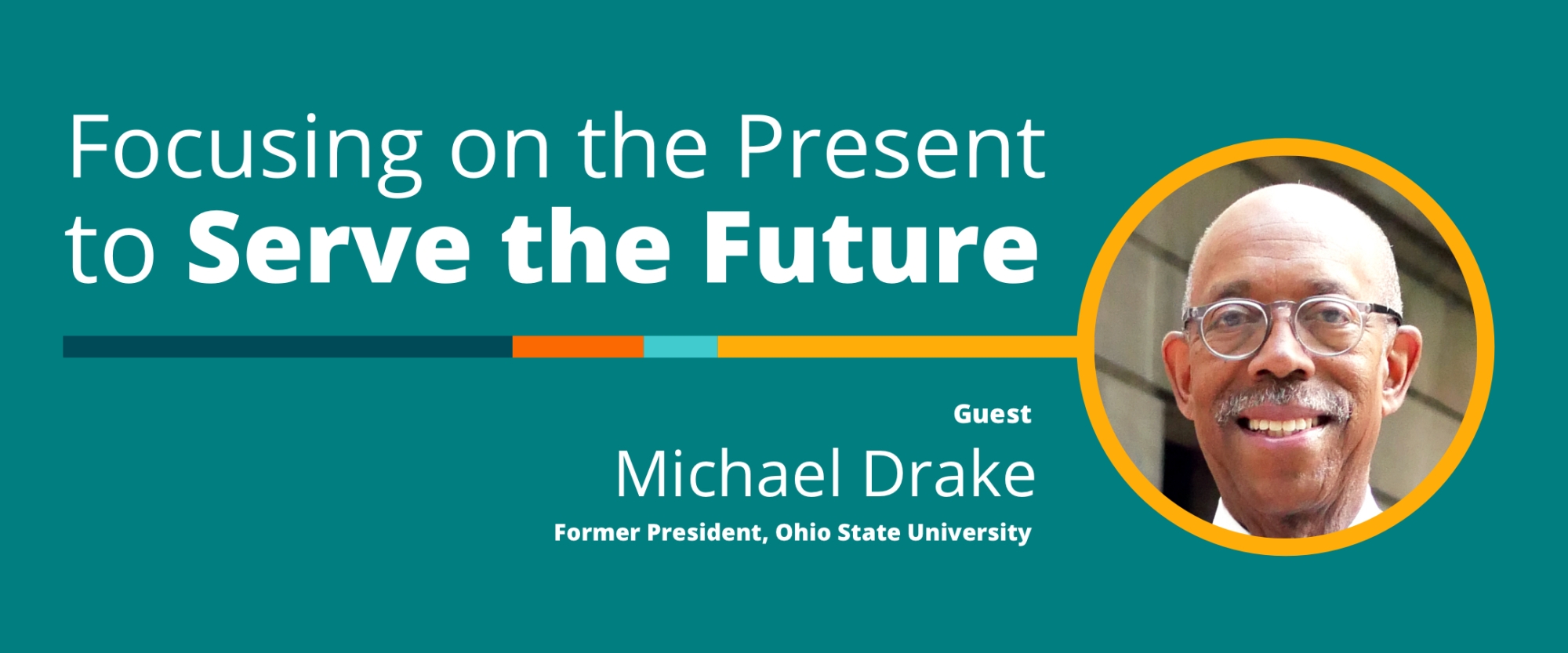Note: This interview, Episode 4 of the Weekly Wisdom Series, originally aired on May 4, 2020 as part of the University Innovation Alliance’s Innovating Together podcast, appearing live on Facebook, Twitter, and LinkedIn.
Here at the University Innovation Alliance, we've partnered with Inside Higher Ed to create the Innovating Together podcast. I'm UIA's Executive Director, and my co-host is Jeff Selingo, author, journalist, and special advisor at Arizona State University. For our fourth conversation in the podcast's Weekly Wisdom series, we spoke with Dr. Michael Drake, outgoing President of Ohio State University. At the time, President Drake had recently put his own resignation events on hold because he felt that continuous leadership was important in seeing the school through the COVID-19 crisis. He's a popular and well-loved personality who continues to inspire colleagues, students, and followers. And from the wisdom that he shared with us, it's clear that he cares about personal engagement, even at a large school like Ohio State during a time of social isolation.
Staying Connected and Being of Service
We spoke with President Drake the day after he delivered his first-ever virtual commencement address. After participating in over 100 such events throughout his career, he noted the main difference between speaking to a stadium audience of 60,000 and speaking to a camera. "Since all of us would have been speaking really to a tiny group of people in a very large number of groups in their living rooms, it felt much more connected, like I was speaking to people as individuals," he reflected. "The words made more of a difference than might’ve been the case before. So maybe we were not together in one way, but we were much more connected another way." Although he was still waiting for more data about the event, he was able to tell us, "The initial feedback was that people felt connected and that they were pleased that we did it. We were quite touched by that. And then tens of thousands were logged in, watching. So it really did seem to work to pull the community together for at least that time."
President Drake has enjoyed a long career of leadership, at Ohio State University and elsewhere. He'd planned his retirement events to coincide with OSU's 150-year anniversary celebration in the spring of 2020, a plan that he willingly set aside when the pandemic changed everything. "It hasn’t bothered me as much as I thought it would," he admitted. "There’s a quote that our friend and colleague, John Glenn, used often: 'The happiest and most fulfilled people he knew were people who were devoted to something greater and more profound than their own self-interest.'" President Drake shared this quote with the graduating class as well as applying its essence to his own duties as the leader of a large university community during a time of crisis. "The point is to try to do what we could do to support our students and support our faculty and support our staff. And we just continued focusing on that."
More Remote Practices Yet Greater Physical Presence
When we asked President Drake if the pandemic had brought any positive changes to higher ed that he'd like to see continuing into the future, the first thing that came to mind was campus healthcare. "As we come out of this, we’ll use telemedicine to enhance our ability to be in touch with people in a more convenient and effective way," he said. "I believe that we’ll still need to see people. But much like the ATM, when you didn’t really need to see your teller as much, I think the telemedicine will allow us to do a whole series of things more conveniently for patients more quickly." He also predicted, "I think that we will have more Zoom or Zoom-like meetings. Coalitions will be able to form and work because we can connect with each other. It’s not thousands of dollars and days out of your life to spend an hour together, and we can exchange the same content effectively that way."
Yet even with all the convenience of remote video platforms, President Drake confessed how much he missed students' physical presence as he watched their faces pop up on Zoom during a freshman seminar. "I believe that our students are really eager to be at college," he told us. "The experience of being at college was something that they valued dramatically. We’re kind of filling a gap, but we appreciate them working so hard. What we really miss is being there with our classmates and friends. We love our families, but we wanted to be out of the house. We want to be there with everybody." Noting that Ohio State had recently passed its statement-to-register date for the 2020-21 school year, he cited a 20% increase for in-state and a 25% increase for out-of-state students. "We’ll see what happens over the summer," he admitted, "but I think this is an experience that people really do value, and it means a lot to us to hear that."
Staying in the Moment
President Drake offered an amusing anecdote to illustrate his advice for dealing with adversity and reacting to the unexpected. Six years ago, one of his final acts as the outgoing chancellor of the University of California, Irvine was sharing the commencement speaking honors with Barack Obama. The President of the United States was accustomed to delivering speeches from a teleprompter, which isn't really standard equipment for university presidents. About seven minutes into reading his speech from the teleprompter, President Drake recalled, "It blinks and goes to blank. Boom. And then we go a few seconds more, and it blinks and it comes up and it’s not my speech. It’s President Obama's speech. And I noticed that, but I kept on talking. And then it blinked and it was my speech again, speeding up to catch up to wherever I was, but for about 30 seconds I had no speech in front of me. I didn’t say anything, no one knew. I just kept talking through whatever sentence I was supposed to finish. And I think that as we stay in the moment, focused on what we’re doing – hopefully prepared for what we’re doing – we can just take ourselves forward and things tend to work out."
Ongoing Enthusiasm for Higher Ed
President Drake acknowledges that, given the uncertainties of COVID-19 and the nation's response, it's not easy to map out the future at an institutional level, especially for a large university like Ohio State. "We are doing scenario planning for a variety of different possibilities of how it’ll be in the fall," he said. "Every week we are a little closer to knowing, but we don't know yet, and so we’re trying to be flexible for that. We believe that the world will recover, as it has from these in the past. We look forward to effective treatments and vaccines, but we know those things will take months. But we expect that we, that the university system, that higher education, which is so important to our world and our way of life, will emerge. When we look at the students who have not been here yet and are looking to next year, they’re really looking forward to this. So we think that with energy and time and coming together, we’ll reimagine ourselves in the post-COVID world."

Links Mentioned in This Episode
• Ohio State University
• Telemedicine (an OSU flagship initiative for student health)
Bios of Guest and Co-Hosts

Guest: Michael Drake, President, University of California
Dr. Michael V. Drake currently serves as the University of California system's 21st president, and as the first Black president in UC's history. Prior to accepting this post in July 2020, Dr. Drake spent six years as President of the Ohio State University, where he helped establish the school's Tuition Guarantee, which made an undergraduate career more affordable for incoming, in-state freshmen. He moved to Columbus following eight years as Chancellor at UC Irvine, prior to which he served for five years as Vice President of Health Affairs for the UC system. He was appointed to this position after over 20 years on the faculty of UC San Francisco School of Medicine, which included serving as the Steven P. Shearing Professor of Ophthalmology and Senior Associate Dean. Dr. Drake's many awards include the University of California Presidential Medal, the Champions of Health Professions Diversity Award, and the Election to the National Academy of Sciences' Institute of Medicine. As a lifelong musician whose first job was at Tower Records, he's enjoyed teaching an undergraduate course on the music of the civil rights movement and was appointed to the Rock and Roll Hall of Fame and Museum board in 2015.

Co-Host: Bridget Burns, Executive Director, University Innovation Alliance
Dr. Bridget Burns is the founding Executive Director of the University Innovation Alliance (UIA). For the past decade, she has advised university presidents, system chancellors, and state and federal policy leaders on strategies to expand access to higher education, address costs, and promote completion for students of all backgrounds. The UIA was developed during Bridget’s tenure as an American Council on Education (ACE) Fellowship at Arizona State University. She held multiple roles within the Oregon University System, including serving as Chief of Staff and Senior Policy Advisor, where she won the national award for innovation in higher education government relations. She was a National Associate for the National Center for Public Policy and Higher Education, and has served on several statewide governing boards including ones governing higher education institutions, financial aid policy, and policy areas impacting children and families.

Co-Host: Jeff Selingo, author, journalist, special advisor at Arizona State University
Jeff Selingo is an author, a journalist, and a special advisor at Arizona State University. He has written about higher education for more than two decades and is a New York Times bestselling author of three books. His latest book, Who Gets In & Why: A Year Inside College Admissions, was published in September 2020 and was named an Editors’ Choice by the New York Times Book Review. A regular contributor to The Atlantic, Jeff is a special advisor for innovation and professor of practice at Arizona State University. He also co-hosts the podcast, FutureU. He lives in Washington, DC with his family.
About Weekly Wisdom
Weekly Wisdom is an event series that happens live on Facebook, Twitter, and LinkedIn. It also becomes a podcast episode. Every week, we join forces with Inside Higher Ed and talk with a sitting college president or chancellor about how they're specifically navigating the challenges of this moment. These conversations will be filled with practicable things you can do right now by unpacking how and why college leaders are making decisions within higher education. Hopefully, these episodes will also leave you with a sense of optimism and a bit of inspiration.
Rate, Review & Subscribe
Learn why hundreds of people have rated this new podcast 5 stars! Please join others and rate and review this podcast. This helps us reach and inform more people -- like you -- to help increase the number and diversity of college graduates in the United States.
Click here, scroll to the bottom, tap to rate with five stars, and select “Write a Review.” Then be sure to let us know what you loved most about the episode! Also, if you haven’t done so already, subscribe to the podcast. We’ll be adding a bunch of bonus episodes to the feed and, if you’re not subscribed, there’s a good chance you’ll miss out.

